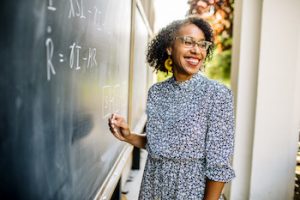 Students in the GAINS (Girls Advancing in STEM) Club recently welcomed Omayra Ortega ’96 for a virtual visit, during which Ortega discussed her work in statistics and mathematical epidemiology and what led to her career as a college math professor.
Students in the GAINS (Girls Advancing in STEM) Club recently welcomed Omayra Ortega ’96 for a virtual visit, during which Ortega discussed her work in statistics and mathematical epidemiology and what led to her career as a college math professor.
Ortega’s route to applied mathematics and epidemiological research was “non-linear,” she told students. Now an assistant professor at Sonoma State College, where she teaches statistics, Ortega majored in math and music at Pomona College as an undergraduate. Abad experience in a general chemistry class made her rethink ideas about a pre-med track.
“I wasn’t focused on science, specifically,” she said. “I was a pure mathematician, I was interested in theory. Math was this complex, intricate game, and I wanted to play… Math is the most interesting subject in the whole world. It’s just puzzles all day.”
Studying math at a high level does not just prepare theoreticians; it opens a world of possibilities for different careers, Ortega learned. It wasn’t until she participated in a summer research experiment at Cornell’s Mathematical and Theoretical Biology Institute that she realized she could combine her love of math with science without becoming a medical practitioner. Mathematical models could help in the development of medical treatments, predicting the spread of infectious disease, and much more.
“I realized I could still be a healer,” Ortega said. “I could still work in medicine, through mathematical epidemiology and mathematical biology.”
After learning that fewer than 1 percent of all mathematics doctorates were awarded to Latina women, Ortega became determined to get her Ph.D. in math. She did so at the University of Iowa, where she also got her master’s in public health. Today, a focus of her work in academia is mentoring and encouraging students of color in STEM. She also directs the Mathematical Epidemiological Research Group (MERG) at Sonoma State, and is the president of the National Association of Mathematicians Inc., a nonprofit promoting excellence in mathematics and supporting the development of underrepresented scholars in the field.
The existence of GAINS at Milton is a thrill for Ortega, she said.
“This is a club that didn’t exist when I was at Milton, so it makes me really happy,” she said. “It’s great when you can get together with like-minded students. It solidifies your own identity as a scientist.”
Ortega was featured in the spring 2020 issue of Milton Magazine.